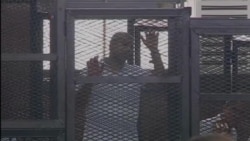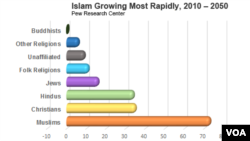ໃນຫຼາຍໆທົດສະວັດຜ່ານມາ ຄວາມເສລີດ້ານການຂ່າວ ໃນ
ທົ່ວໂລກ ແມ່ນໄດ້ຫລຸດນ້ອຍຖອຍລົງ ຈົນເຖິງຂັ້ນຕ່ຳທີ່ສຸດ
ເມື່ອປີກາຍນີ້ ອີງຕາມບົດລາຍງານສະບັບນຶ່ງ ທີ່ໄດ້ນຳອອກ
ເຜີຍແຜ່ ໃນວັນພຸດມື້ນີ້ ໂດຍກຸ່ມປົກປ້ອງສິດທິມະນຸດສາກົນ
ກຸ່ມນຶ່ງ.
ການສຳຫລວດປະຈຳປີ ຂອງອົງການ Freedom House
ກ່າວວ່າ ບັນດານັກຂ່າວໃນທົ່ວໂລກ ພວມປະເຊີນກັບ ການ
ຈຳກັດຫັດແຄບຕ່າງໆ ທີ່ໄດ້ວາງອອກມາ ຕໍ່ພວກເຂົາເຈົ້າ
ໂດຍອຳນາດ ທີ່ລວມທັງ ລັດຖະບານຜະເດັດການຕ່າງໆ
ພວກກໍ່ການຮ້າຍ ແລະ ພວກເຈົ້າຂອງສື່ຕ່າງໆ ທີ່ປະສົງຜົນ
ປະໂຫຍດ ທາງດ້ານເສດຖະກິດ.
ພວກລະເມີດ ທີ່ຮ້າຍແຮງທີ່ສຸດ ຈາກການຈັດອັດດັບ 199 ປະເທດ ຫຼື ດິນແດນຕ່າງໆ
ຂອງອົງການດັ່ງກ່າວ ແມ່ນມີ ເກົາຫຼີເໜືອ ອຸສເບັກກິສຖານ ເທີກເມນິສຖານ ເບລາຣຸສ
ຄິວບາ ຊີເຣຍ ອີຣ່ານ ແລະ ຄຣາເມຍ. ສ່ວນປະເທດ ນໍເວ ສະວີເດັນ ແລະ ແບລຈຽມ
ແມ່ນຢູ່ອັນດັບເທິງສຸດ ຂອງບັນຊີລາຍຊື່ນັ້ນ.
ລວມທັງໝົດແລ້ວ ອົງການ Freedom House ກ່າວວ່າ ມີ
ພຽງ 14 ເປີເຊັນ ຂອງປະຊາ ກອນໃນທົ່ວໂລກ ອາໄສຢູ່ໃນ
ບັນດາປະເທດ ທີ່ເສລີນັ້ນ “ບ່ອນທີ່ມີການລາຍງານຂ່າວ
ດ້ານການເມືອງ ຢ່າງເຂັ້ມແຂງ ຮັບປະກັນຄວາມປອດໄພ
ຂອງບັນດານັກຂ່າວ ການແຊກແຊງເຂົ້າໃນ ກິດຈະກຳ
ຕ່າງໆ ຂອງສື່ມວນຊົນ ແມ່ນມີໜ້ອຍດຽວ ແລະການລາຍ
ງານຂ່າວ ບໍ່ເປັນເລື້ອງ ທີ່ລຳບາກ ດ້ວຍການຖືກກົດດັນ
ດ້ານກົດໝາຍ ຫຼື ດ້ານເສດຖະກິດ.”
ບົດລາຍງານດັ່ງກ່າວ ໄດ້ໃຫ້ເຫດຜົນ ຂອງການຫລຸດນ້ອຍ
ຖອຍລົງ ໃນເສລີພາບດ້ານການຂ່າວນັ້ນ ຍ້ອນການເພີ້ມຂຶ້ນ ຂອງກົດໝາຍຕ່າງໆ ທີ່ຈຳກັດ ຫັດແຄບ ຕໍ່ສື່ຂ່າວນັ້ນເອງ. ບົດລາຍງານກ່າວອີກວ່າ ກົດໝາຍເຫຼົ່ານັ້ນ ສ່ວນຫຼາຍແລ້ວ ແມ່ນໄດ້ຖືກຮັບຜ່ານ ທີ່ເຫັນໄດ້ຢ່າງຈະແຈ້ງ ວ່າ ແມ່ນເພື່ອເຫດຜົນ ຄວາມໝັ້ນຄົງແຫ່ງຊາດ.
Global press freedom declined last year to its lowest level in more than a decade, according to a report issued Wednesday by an international human rights monitoring organization.
Freedom House's annual survey said journalists across the world face restrictions placed on them by forces including authoritarian governments, terrorists and media owners with business interests.
The worst offenders on the organization's ranking of 199 nations or territories were North Korea, Uzbekistan, Turkmenistan, Belarus, Cuba, Syria, Iran and Crimea.Norway, Sweden and Belgium topped the list.
Overall, Freedom House says just 14 percent of the world's population lives in free countries "where coverage of political news is robust, the safety of journalists is guaranteed, state intrusion in media affairs is minimal, and the press is not subject to onerous legal or economic pressures."
The report attributed the decline in press freedom to an increase in restrictive laws against the press. It said these laws were often passed ostensibly for national security reasons.






